Croatian Mountain Rescue Service Book Presented by Ivo Pilar Social Research Institute in Gospić
May 16, 2021 - Suitable for the 30th anniversary of one beloved Croatian civil protection organisation, the Croatian Mountain Rescue Service book was presented by the Ivo Pilar Social Research Institute based in Gospic.
With many tourists and visitors (and Croats too), not being too careful when going on ''their little adventures'' up mountains such as the Dinara, Velebit, or elsewhere, the Croatian Mountain Rescue Service (HGSS) is as busy as Batman in Gotham. What with saving people who get lost, being bitten by poisonous animals that live on the mountains, or dealing with people who have hurt themselves in any way, they truly are praised as superheroes and are often the most beloved people on Croatian TV, either in commercials or when the press, telling their heroic tales.
Apart from mountains, their training was also shown to be useful for easing the numerous issues left following the 2020 earthquakes too.
Marking the 30 year anniversary of HGSS's station in Gospić, the Gospić Culture And Information Centre saw the presentation of the book ''The Day Replaced the Night, The Bura Wind Cleared Our View“ (Dan Je Zamijenio Noć, Bura Nam Očistila Pogled), last Friday. As reported by the Ivo Pilar Social Research Institute website, the authors of this pop-science monograph are dr. Ivan Brlic, dr. Nikola Simunic and Dr. Anita Busljeta Tonkovic.
''The Gospic HGSS station, even though with a relatively small member count, operates on the biggest and toughest rescue surfaces in all of the Republic of Croatia. This monograph, through geographical, historical and sociological context, aims to explain how important, but also how difficult the mountain rescuer's job is. The Croatian Mountain Rescue Service book, covering over 150 pages in an honest and interesting way, shows why HGSS is one of the cornerstone operative forces of civil protection and that, in its professional, altruistic, and humane approach, contributes to the overall civil rescue system with the goal of saving human lives,'' they stated from the Ivo Pilar Social Research Institute.
Apart from the authors of the Croatian Mountain Rescue Service book themselves, the event saw HGSS Croatia's main man, Josip Granic, the director of the HGSS Gospic station, Josip Bozicevic, Deputy Interior Minister Damir Trust, as well as the Ivo Pilar Social Research Institute Headmaster, Dr. Zeljko Holjevac sit down and speak. All of them agreed that this book is an important statement of gratefulness to HGSS members for all of the hard work they do.
The book is a product of the Ivo Pilar Institute's successful collaboration with the institutions in Gospic, and the wish for the further and deeper continuation of that cooperation was expressed too. In case of need, HGSS can be reached by calling 112. But, to prevent becoming yet another damsel (or a bachelor) in distress, it's not a bad idea to check their safety guidelines for enjoying the outdoors in Croatia.
Not to far from Gospic is the North Velebit National Park with its glorious mountains, about which you can learn more on our TC page.
For more about the Ivo Pilar Social research Institute in Croatia, follow TCN's dedicated page.
If You Want to Save Others, Put Yourself First: An Interview with Josip Granić, Head of Croatian Mountain Rescue Service
June 12, 2021 - Croatia is often described as one of the safest countries in the world. However, even if no danger will come to them, many people will still actively seek it - with disastrous consequences. To discuss this phenomenon, we sat down with Josip Granić, the youngest head in the history of Croatian Mountain Rescue Service (CMRS) a volunteer, nonprofit organisation which in 2020 celebrated the 70th anniversary of its founding.
In 2007, this Split-born CRMS instructor, dog handler, helicopter rescue trainer, and international Swiftwater and flood rescue instructor won the award 'Pride of Croatia' for saving a four-year-old boy who had wandered off into the forest near his home. During the filming of Game of Thrones in Split, he served as the marine department member, ensuring all safety protocols were being implemented when working around the sea, and acted as a rowing instructor for some of the actors. He is proud to point out that in all of its 70 years, no CMRS member was seriously injured or died in an intervention, nor did a single person who they rescued.
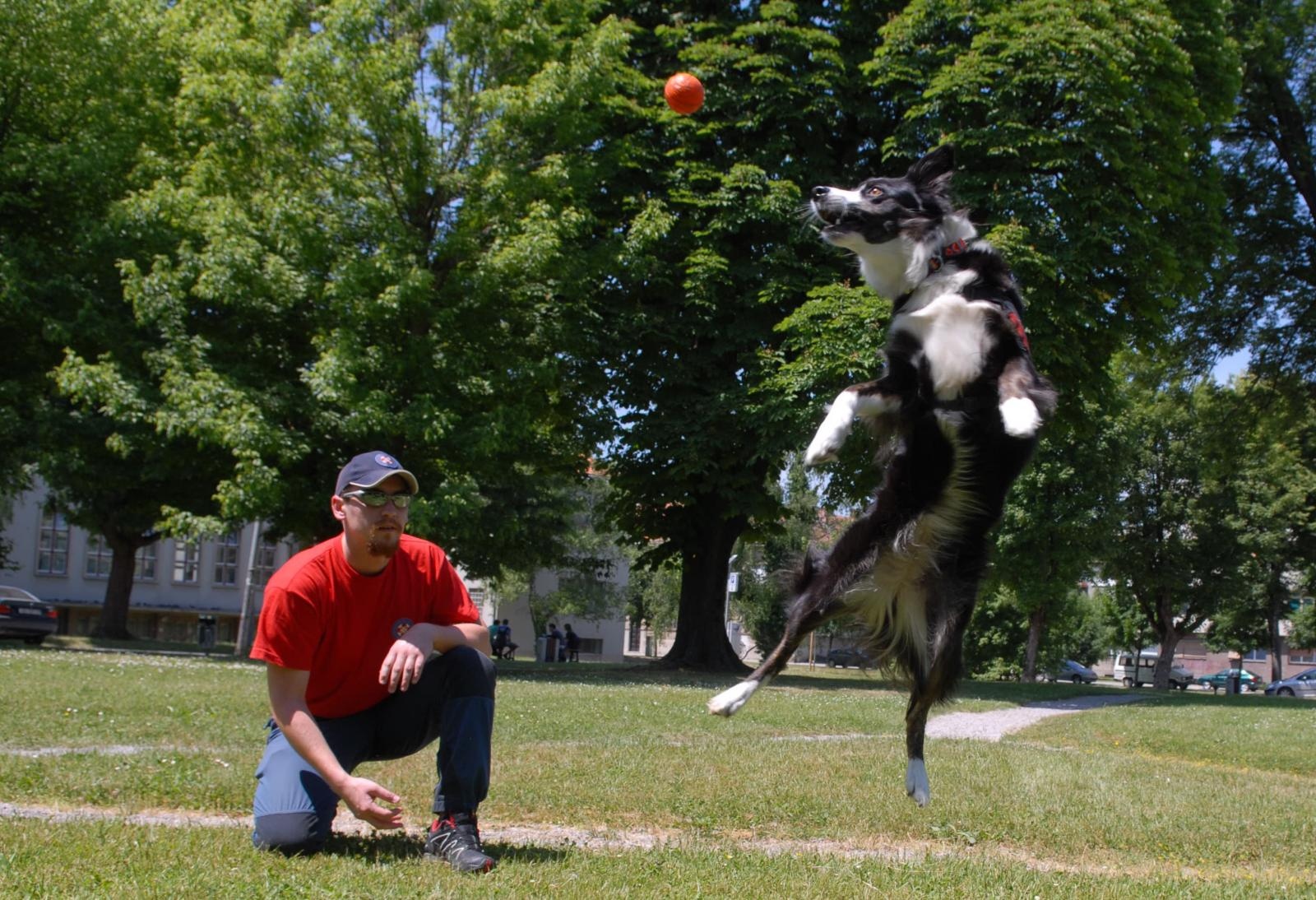
Josip Granić with Hosan, a Scottish border-collie who was involved in the rescue mission of a four-year-old boy in 2007. Hosan passed away in 2015. © Kristina Stedul Fabac/Pixsell
1. Can anyone join and become a member of CMRS? What does the process of admitting new members to CMRS look like?
In accordance with Croatian Mountain Rescue Service Statute, a potential candidate must get a recommendation of two mountain rescuers (there are several categories of members: rescuers, mountain rescuers, instructors, and so on), as mountain rescuers are, as a rule, experienced and long-term members of CMRS.
However, considering the workload and a wide variety of tasks of our organisation, we are also accepting members who had not necessarily been suggested by the aforementioned mountain rescuers.
Still, it’s important to emphasize that it is always CMR who initiates contact with potential members – and not the other way around. There are exceptions, of course, but, as a rule, we don’t accept applications.
So, the short answer would be that existing members nominate new members.
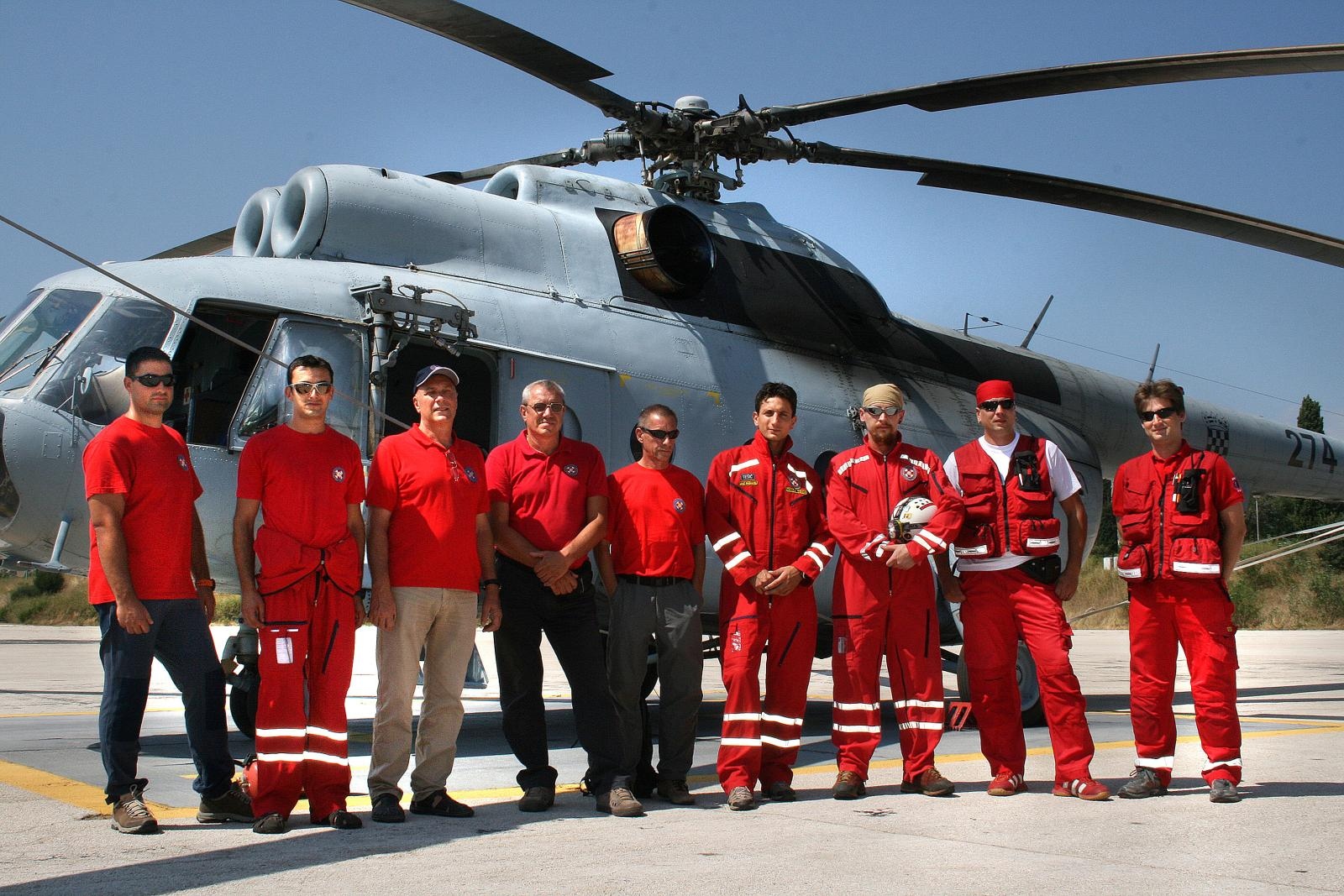
© Ivana Ivanovic/Pixsell
2. Who selects new members and according to what criteria? Are they required to have previous experience or certain qualifications?
Members are selected based on their CV – we look for specific activities which would make a person a useful addition to our organisation – hiking, speleology, alpinism, skiing – or specific knowledge we may need at the time – PR or IT skills. Those who had suggested the candidate also get a chance to tell us more about them and why they find them suitable for the position in question.
Then, all those who are present at a meeting – new members are selected at CMRS meetings - cast their vote, and the person is accepted as a member.
When it comes to essential skills we look for as an organisation (experience in hiking, alpinism, and so forth), the people we choose need to be exceptional in their field, and that generally goes for all other positions we require, such as IT experts, or medical professionals.
Then, they all go through our training which ideally lasts for two to two-and-a-half years.
There are many additional courses our members go through throughout their time with us. The process of learning never really ends for a CMRS member and all of us continually work on improving our knowledge and skills.
Our members need to be physically fit as well– we require a medical certificate which states that a person doesn’t suffer from any chronic illness which would prevent them from participating in any of our activities. And last but not least – we value and appreciate a person’s altruism and wish to do something for the benefit of the community.
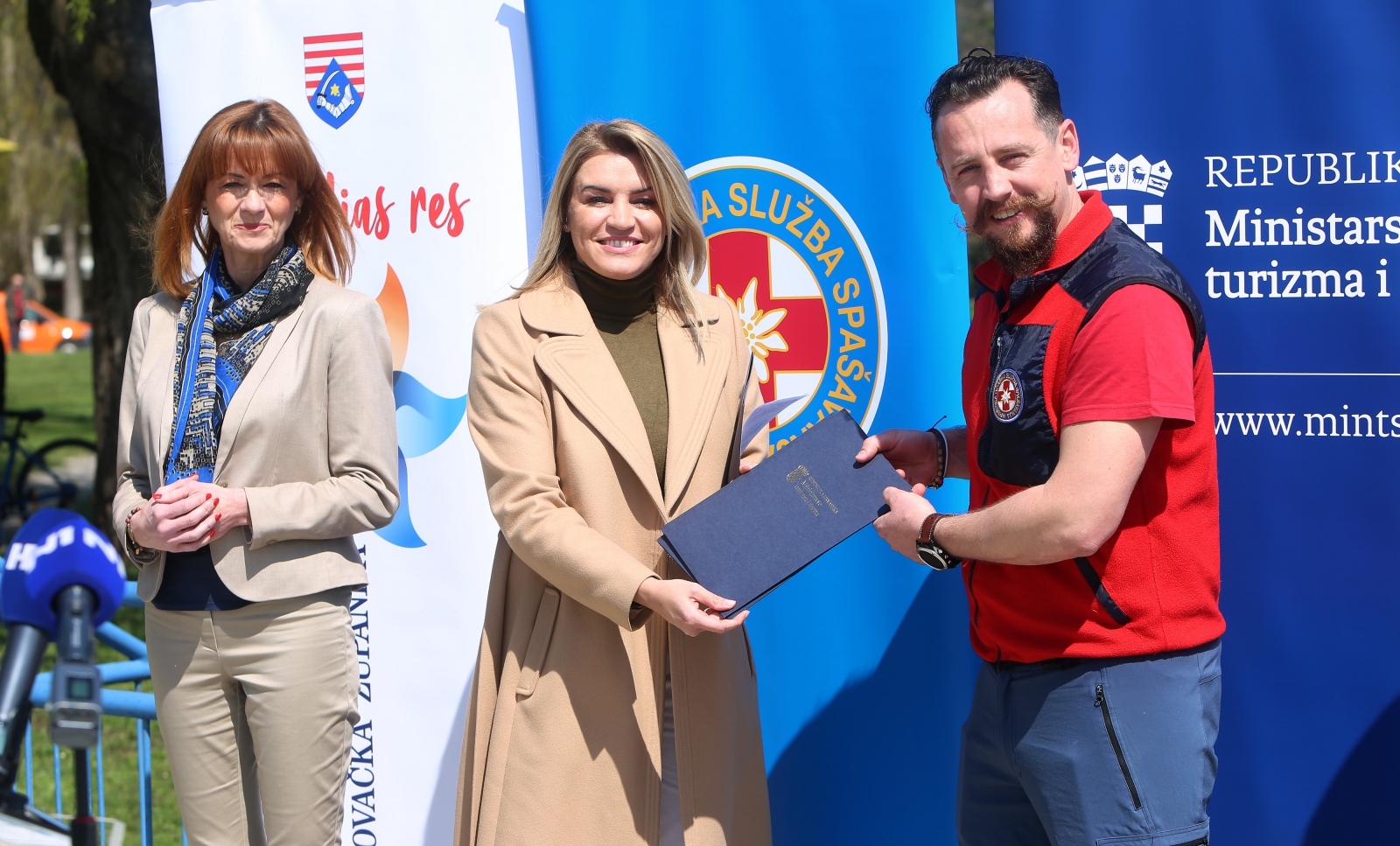
In April 2021, CMRS' Karlovac station received funding from the Ministry of Tourism. © Kristina Stedul Fabac/Pixsell
3. CMRS is a nonprofit, volunteer organization. Members donate their time voluntarily, and the CMRS does not charge for its services.
So, how does CMRS finance itself?
Exactly. CMRS is a volunteer organisation that consists of twenty-five base stations all across Croatia. Most of the work we do is free, there is only a small number of specialized watches for which the members receive compensation in the form of coverage of their expenses.
Since CMRS is a public organisation, it is funded by the state budget – the state covers larger national actions and training, our work clothes, and so on.
The twenty-five base stations are financed by the units of local self-government in accordance with Law on Local and Regional Self-Government and Law on Civil Protection System.
4. Although CMRS is most heard about in the summer, the season for CMRS lasts all year long. What else does CMRS do besides rescue operations?
Our activities are defined by the law. Aside from rescue operations, we work on prevention programs. Some of it includes working in co-operation with mountaineering associations – we mark mountain hiking trails, make tourist trail guides and maps for hiking – this way, people get lost less frequently and also get a better experience of the non-urban areas – which are, to us, especially interesting. Then, there are prevention programs and courses for the general public, different public institutions, and so on.
We also organize educational courses for adventure tour operators and tour guides.
We are involved in a wide array of different activities and rescue operations, which catch the most media interest - nothing against it, of course - are merely the tip of an iceberg, so to say.
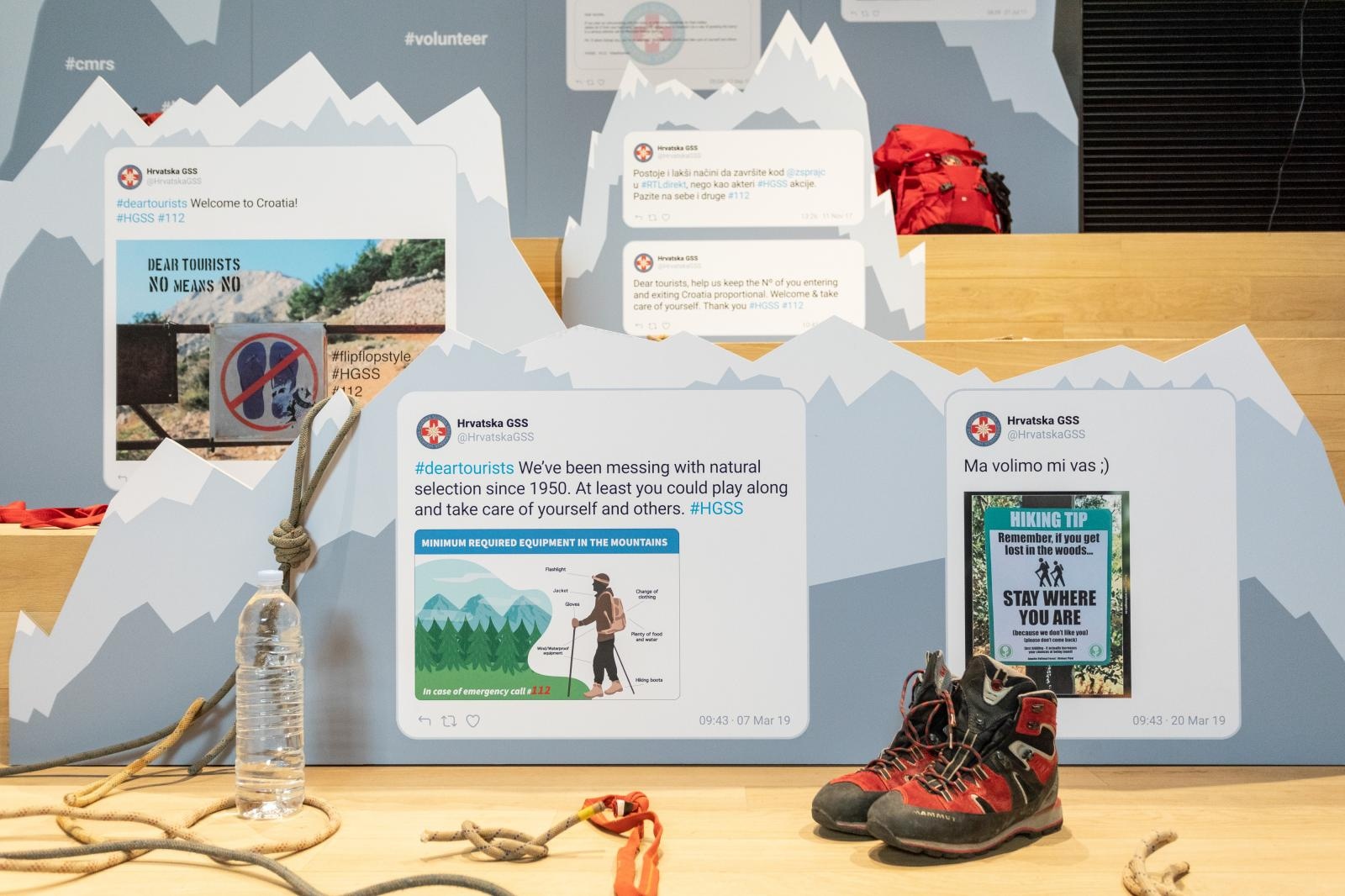
A 2020 exhibition of CMRS' tweets. © Davor Puklavec/Pixsell
5. With the arrival of the summer season, CMRS conducts educational, often humorous campaigns on social networks aimed at raising awareness of the importance of not overestimating our abilities.
Can you single out a situation that is especially etched in your memory for any reason?
Yes, we conduct these campaigns – seasoned with a lot of sarcasm and irony – because that’s, in our experience, what makes them memorable and the best way to truly get through to people.
If I were to say something generic, like ‘Don’t forget to take a bottle of water with you on your hiking trip’, it would sound boring.
As for some, let’s say, curious situations, I would single out two events – they involved my colleagues and not me personally. Once, CMRS came across a cyclist stuck in the middle of a steep hiking trail on Hvar. It was so steep in some places that it practically stood at a 90° angle. And the man had chosen to 'climb down' riding his bike. He was rescued thanks to our brilliant local team, but yes, that is one situation in which a foreigner did something, well, unexpected.
Another time, we got a call about a man who had last been seen climbing Biokovo mountain. The team came, they rescued him using a helicopter – he was very dehydrated and he started to gulp down the water they had offered him. And while we were trying to persuade him to take smaller sips, he started to explain that he hadn’t been alone - as the call we had received had indicated - and that we should go back for his father, who had presumably taken shelter behind some rock, so the team couldn’t see him upon arrival. The thing is, he didn’t say anything until the helicopter was already a significant distance away from the location they had found him at!
Interventions involving foreign tourists make up only fifteen to twenty percent of all our search and rescue operations.
The rest, about eighty percent, involve local people, but quite understandably and naturally, stories about foreigners gain more media interest.
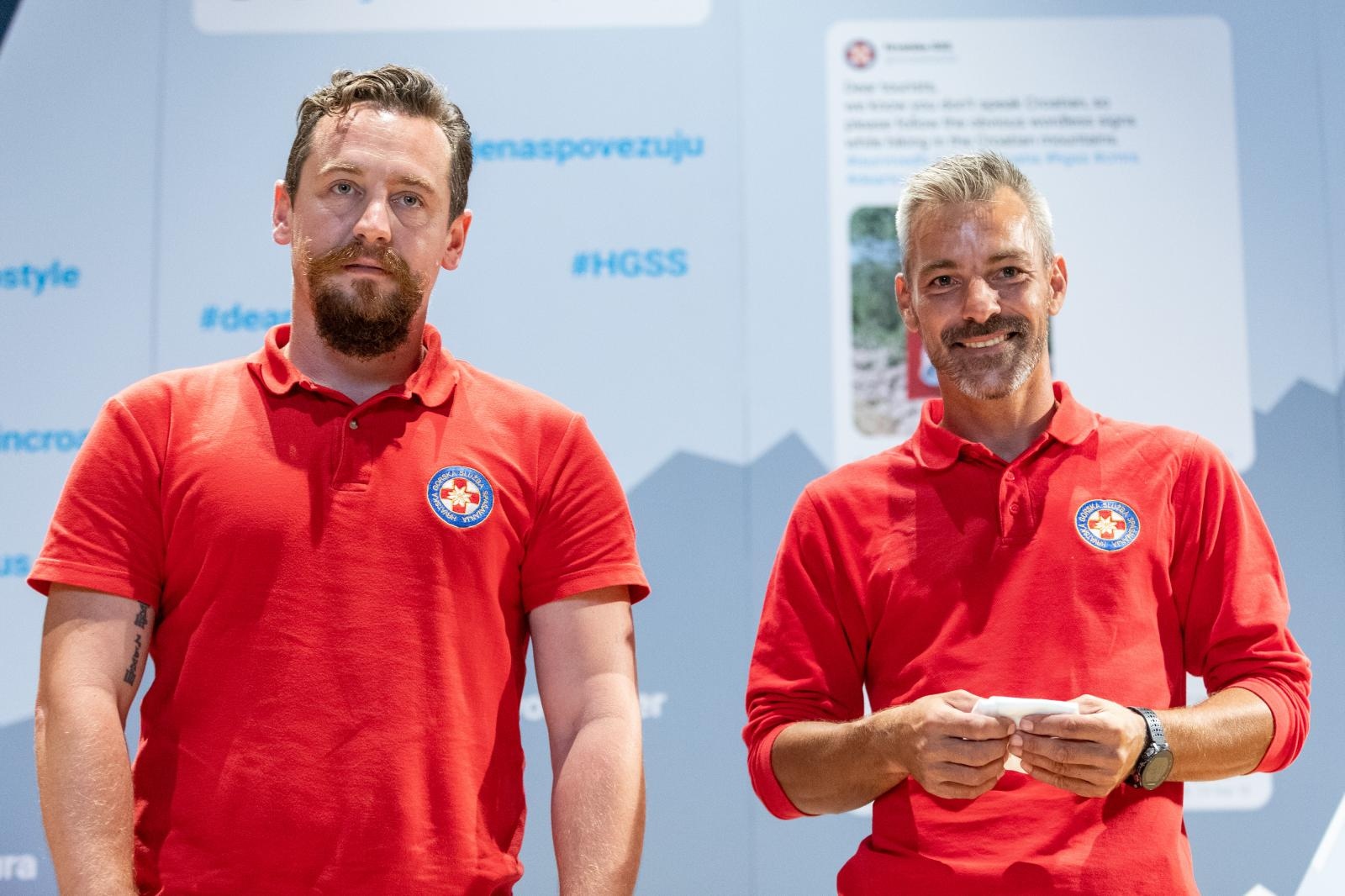
© Davor Puklavec/Pixsell
6. There is a running joke that CMRS’ tasks mainly boil down to rescuing foreigners who got stuck on a mountain because they had decided to hike in flip-flops. Is there any truth in that? Why do accidents and the need for intervention most often occur?
Like I already said, we mainly intervene in situations involving local people – but you rarely hear about an accident involving an old lady, as that doesn’t make for a sensational piece of news. The attention that the cases about foreign people attract enables us to raise public awareness and warn the people what not do.
More often than not, however, such cases turn into public campaigns which everyone uses to express their opinion of how things should be done.
The flip-flops thing is an urban – or in this case – a rural myth.
The fact is, people venture off into nature unprepared. The flip-flops case can be used as a synonym for a number of things. If you decided to climb a mountain in the middle of summer and brought only half a liter of water – it’s the same as wearing flip-flops. Or if you were to participate in Snow Queen (World Cup alpine ski race in Croatia) in the winter, wearing low-top shoes. It can’t be done.
The problem is that the people don’t educate themselves enough, don’t consult hiking manuals or look up any type of information which is easily accessible online, on the official pages of professional institutions, such as the Croatian Mountaineering Association or any other association which centers around hiking or climbing and which must stand behind what they wrote on their pages.
People - some people, that is - don’t possess certain knowledge of how to prevent an accident or what the best course of action would be. The more we know, the less likely we are to make a mistake.
Accidents happen when we overestimate our abilities and underestimate nature. The attitude ‘it’s an easy climb’ or ‘it’s not far, it’s right here, under our nose’ combined with the lack of knowledge of what to do when we get lost, get hurt, or notice something suspicious.
Accidents occur due to people’s wrong estimation in a nutshell. When I say 'a wrong estimation’, I mean that of both subjective and objective circumstances. You can’t influence certain things – such as the weather, you can’t control a storm, but you can inform yourself and know that one is coming and decide to stay home.
That, coupled with decisions made in ignorance of rules and procedures always leads to accidents.
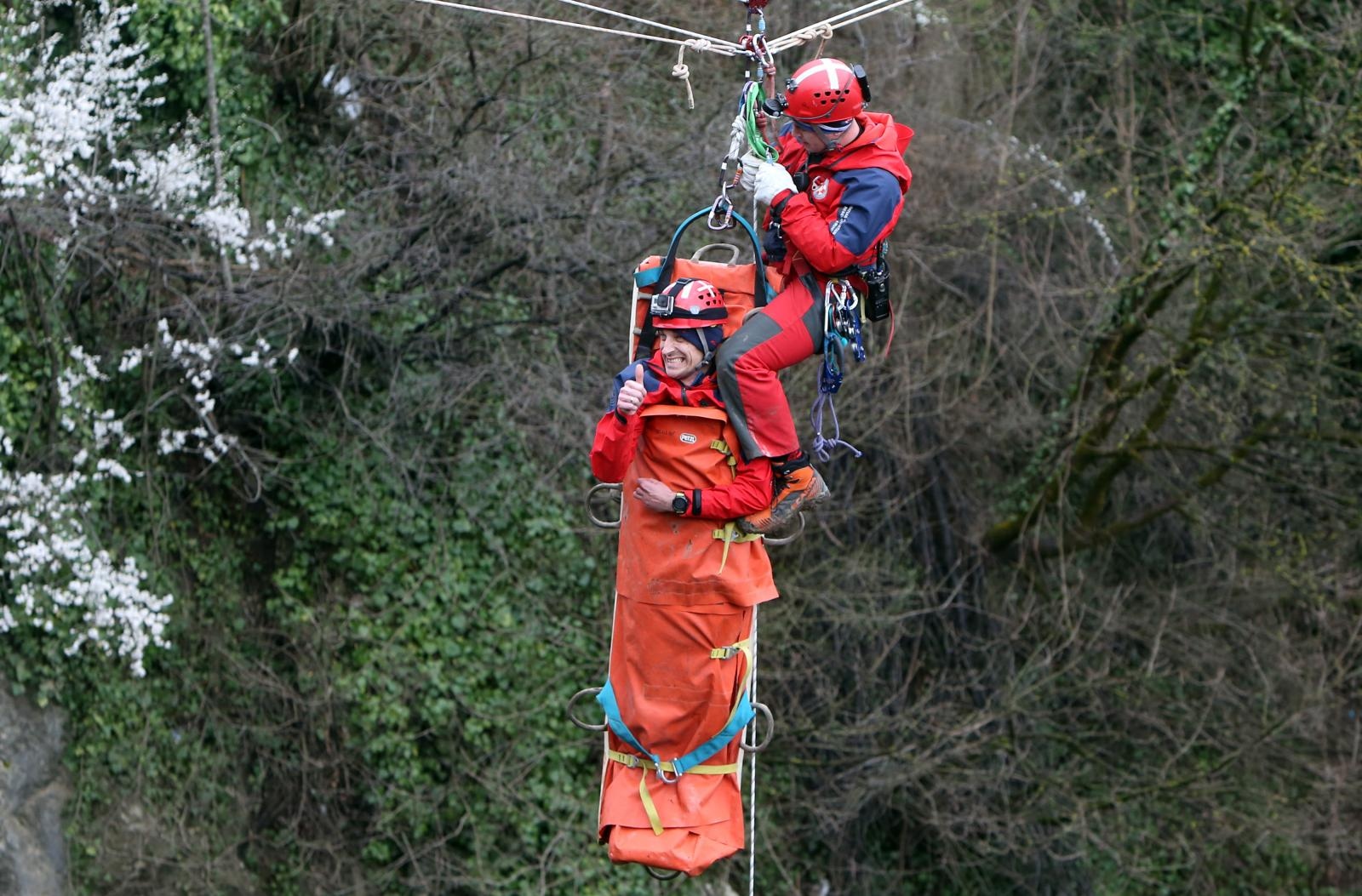
© Kristina Stedul Fabac/Pixsell
7. What does an ‘’average day’’ of a CMRS volunteer look like? Is there such a thing at all, or does each day look different, depending on the circumstances? Given that the CMRS’ headquarters are located in Zagreb, are the members expected to come to Zagreb from time to time?
Members of CMRS are volunteers. There are about forty members who are both volunteers and employees, and they perform everyday administrative tasks. When accidents occur, they must get permission from their primary employer to miss work. When they are on watch duties, they need to take time off work, use their vacation days. Rescue missions are voluntary activities that cannot be predicted and there are no set work days for that, of course. Other members who are not employed by CMRS know that they could be needed at any time. Of course, if they work as doctors, surgeons, we don't expect them to drop everything and go on search and rescue missions, but that is why we have a large membership, to make sure everything is covered. So, people are able to plan put their days, but some things (such as rescue missions) are out of our control. We work 24/7, 365 days a year.
CMRS has twenty-five base stations and one of them is located in Zagreb. If regular members come to Zagreb, they usually come to visit Zagreb's base station.
Our headquarters are where our administrative staff works, where we sort out the paperwork, plan out the EU-funded projects, and so on.
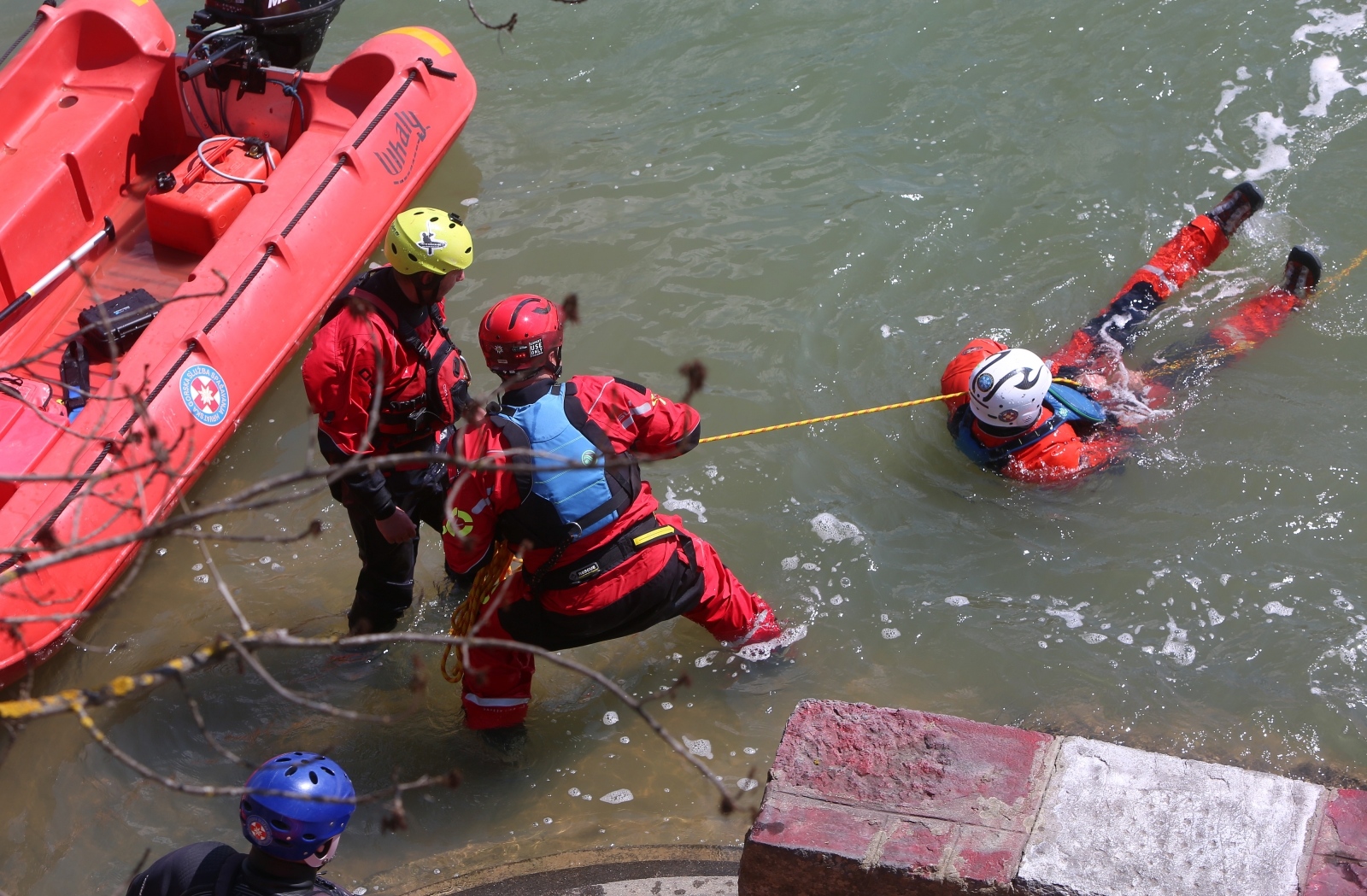
© Kristina Stedul Fabac/Pixsell
8. And finally, what piece of advice would you give to all amateur climbers and nature lovers out there who, with the arrival of nice weather, are starting to make plans to embark on adventures across our beautiful Croatia?
My message to everyone – regardless of how experienced or inexperienced they are, would be, ‘put yourself first’. Always. That means ‘put your safety first’. If you do that, if you think about what to do to make your safety a priority, it will help us, too. That is also the maxim of the Croatian Mountain Rescue Service: I put myself first, my team second and the injured person last. The reason for this is simple. If something were to happen to me, then my team can’t concentrate on the injured. By putting ourselves first, we are actually helping the person who needs to be rescued.
However, in the best-case scenario, there is no need for our intervention because the person has prioritized their own safety and taken the time to inform and educate themselves. And to us, that’s great. There is nothing we like more than when we are ‘’out of work’’. We are most glad when our role is to conduct educational workshops and other activities which don’t include search and rescue operations.
Put yourself first, stay informed, don’t overestimate your abilities – look up and observe the sky, see if there are clouds coming your way, what kind of wind is blowing, those basic things. It’s relatively easy to see what kind of weather one can expect. But, if you lack knowledge or information, you can always ask locals or check the website of the Croatian Mountain Rescue Service, the Croatian Mountaineering Association, or any other mountaineering or hiking association. Stay safe and act responsibly, that’s the key.
For more about made in Croatia, follow TCN's dedicated page.
For more about Croatia, CLICK HERE.
Croatian Mountain Rescue Service Receives Donation of Premium Tires by Finnish Manufacturer Nokian
June 9, 2021 - The Croatian Mountain Rescue Service (HGSS), a volunteer, nonprofit organisation specialized in search and rescue, has received a donation of tires for their vehicles, manufactured by a Finnish company Nokian.
As reported by HGSS on their official website, In Vulkal's branch office on Slavonska Avenue, starting at 10:00 a.m., a formal conference was organized on the occasion of the donation of premium tires of the Nokian brand to the Croatian Mountain Rescue Service, which was immediately set up on rescue vehicles.
The ceremony was attended by the director of Vulkal, Mr. Željko Kalečak, a representative of the Finnish manufacturer Nokian tires Mr. Ivan Bura, the Head of HGSS Mr. Josip Granić, and a representative of the Commission for Information and Analytics of HGSS Mr. Jadran Kapović. The donation is the crown of many years of cooperation between Vulkal and Nokian Tires, an effort to provide maximum safety and comfort to drivers and other road users. It is this commitment to the well-being, prosperity, and recovery of a society affected by earthquakes and pandemics that have resulted in cooperation with one of the most respected humanitarian organizations on Croatian soil.
Few will not recognize the mission and need for the existence of the Croatian Mountain Rescue Service, from which originates the desire and task of preserving human lives in all terrains and in all conditions. An organization that has so far saved thousands of injured people, found the lost, comforted the frightened, reunited families, enabled the emergence of new ones. Fearless professionals willing to sacrifice their own lives to save others need reliability and endurance in the field to carry out their interventions as professionally as possible.
"From the very beginning, Vulkal has taken care of the safety of drivers and vehicles, with a full commitment to the quality of service and every tire delivered. We are extremely pleased to give our contribution to the volunteers of HGSS, whose work and commitment we follow with great respect and deep affection. In moments when every second counts and there is no room for error, top-of-the-line Nokian tires will provide them with first-class stability, faster and safer intervention, and easier access to off-road locations'', said Mr. Kalečak, director of Vulkal and continued:
“The brave heart of HGSS is a real inspiration to all who nurture a similar vision, feel a similar vocation. Protecting human lives, providing timely assistance and unconditional support are the main drivers of social development, but also goodness in others that creates a better and safer tomorrow for all. That is why we are extremely pleased with this donation and all the activities that are just ahead of us'', concluded Mr. Kalečak.
A similar postulate is evident in Nokian’s 120-year-long business tradition dedicated to providing safety, peace of mind, and a new driving experience that combines experience and visionary technology, emotion, and adventure.
The representative of Nokian, Mr. Bura, also gave his opinion on the donation and emphasized: “For us as a company that had a great influence on the development of tires, a company that designed the first winter tire, improving safety and preserving the environment is a sincere pleasure to support organizations such as the Croatian Mountain Rescue Service. Their goals in unconditional and voluntary help are priceless, they are a shining example of working for the common good and the well-being of all of us. We are honored that together with the company Vulkal, our long-term partner in the Republic of Croatia, we will join forces and together at least help the HGSS members and make their voluntary and hard work easier and safer with a huge thank you. This support is not a one-off, but a pledge for a common future with people with a big heart, in the years to come. ”
Thanks for the donation on behalf of the Croatian Mountain Rescue Service were sent by its Head, Mr. Granić, stating:
"Our work must be without error because our primary and greatest goal is to preserve and save human lives. In our work, we use a number of tools to help someone and carry out a successful rescue operation. One of the tools is our vehicles, which must be equipped with quality tires in order to be able to move on all terrains where we operate. With this donation, we will certainly be ready to respond to all challenges in those hard-to-reach areas. Thanks to Vulkal and Nokian for the donation, engagement, and effort on behalf of HGSS, but indirectly also on behalf of everyone who will need our help in the future. We are happy that with this donation, our team of experts has further expanded, and thus enabled even faster, higher quality and better operation of our organization.''
A respectable member of HGSS, Mr. Kapović, also commented on the donation: "70 years are behind us. Today, the HGSS has over 1,000 members and has successfully performed more than 10,000 interventions. To the HGSS as a voluntary association financed by state institutions and with the funds of local self-government units, every donation means a lot. We are pleased that Nokian Tires and their representative in our country, Vulkal, have recognized our work and decided to support us by donating ambulance tires. It will certainly help us in a better organization of work and raise the level of readiness and provide even better conditions for emergency interventions.
This is just the beginning of the collaboration between Vulkal, Nokian, and HGSS and we really appreciate that Nokian is donating quality ambulance tires not only to us, but to all rescue services.
We would also like to thank Vulkal, which for its part made professional vulcanizers at our disposal and professionally installed tires on our vehicles, and enabled the realization of the entire donation."
With a commendable donation, Vulkal and Nokian raised the level of safety and provided optimal support to the bravest Croatian rescuers who, thanks to top-quality tires, will now rush even more urgently and reliably to help those who need it most.
For the latest news from Croatia, follow TCN's dedicated page.
FO


